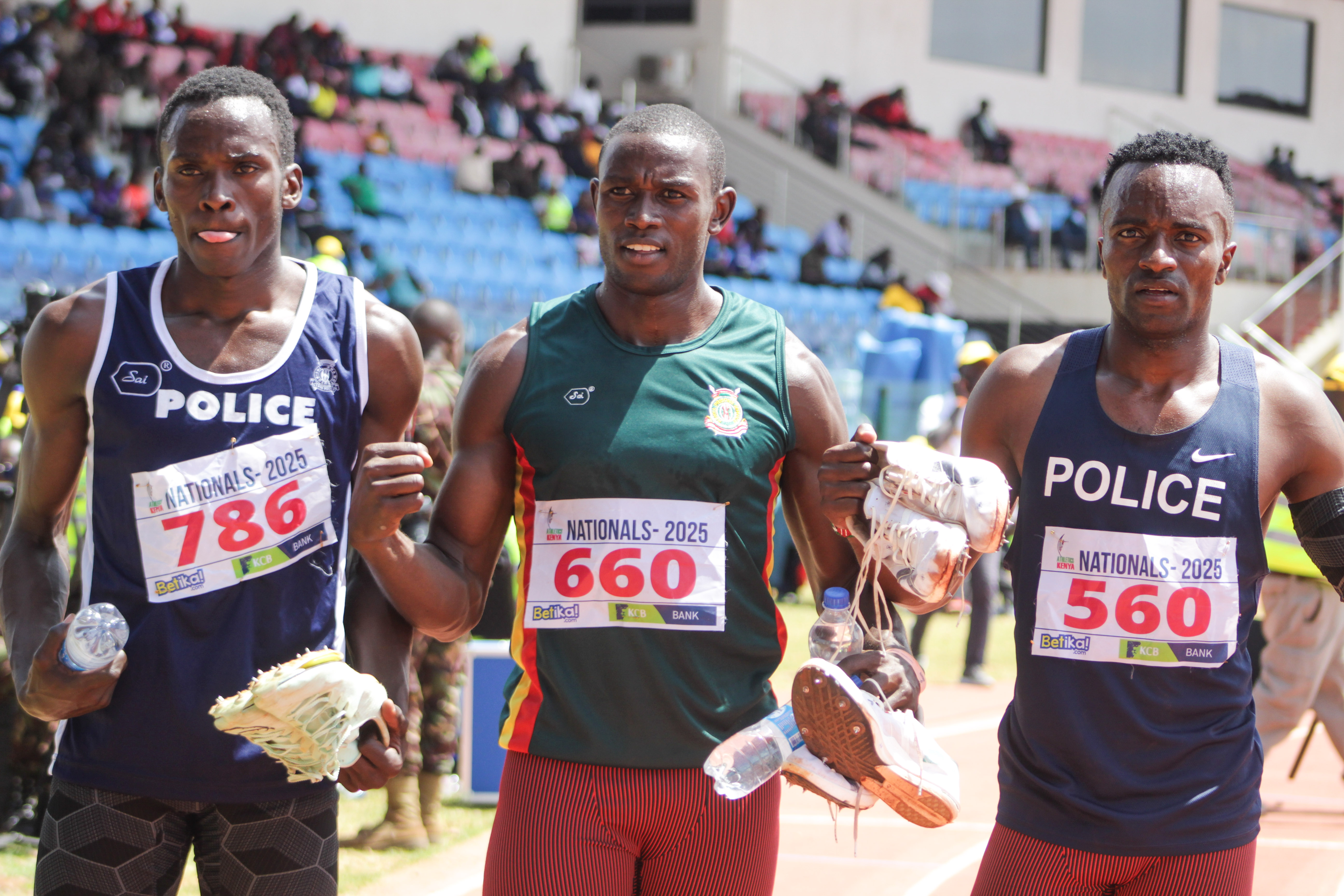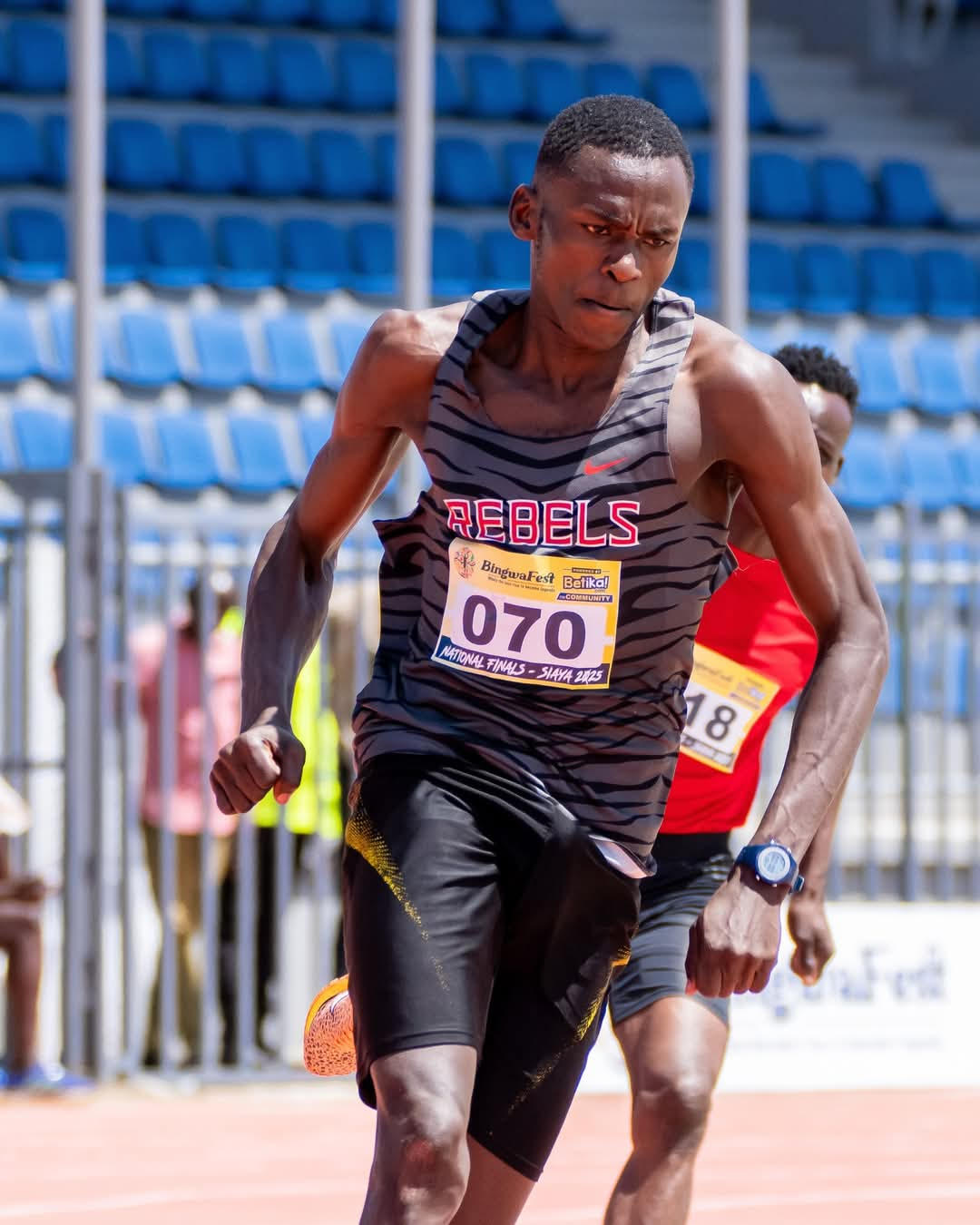

Kenya will, for the first time since 2017, send three athletes in the men’s 400m to the World Championships. The expedition is fueled by the hope of sparking a long-awaited sprint revolution in a land famed for distance glory.
The last time the nation witnessed three representatives in the one-lap event was eight years ago at the 2017 London Championships.
On that occasion, seasoned sprinters Boniface Mweresa, Raymond Kibet and Collins Gichana carried the country’s expectations of medals at the global showpiece. They, however, fell short of the prize.
Gichana and Kibet bowed out in the heats, while
Mweresa clawed his way into the semi-finals, only to see his campaign end after clocking 45.93 secs in his heat.
Next week, as the global bonanza unfurls in Tokyo,
the baton of hope will rest firmly on the shoulders of Kelvin Kipkorir, George
Mutinda and Brian Tinega.
The trio step into the arena burdened with history
yet blazing with desire, to deliver Kenya only its second medal over the 400m
since the late Samson Kitur’s majestic bronze in Stuttgart back in 1993.
In that fabled race, Kitur, with fire in his legs,
stopped the clock at 44.54 to finish behind former world record holder Michael
Johnson (43.65) and Butch Reynolds (44.13).
Kitur is the only Kenyan to have ever claimed a World Championship medal since Kenya’s first participation in Helsinki in 1983. What followed was a long drought.
From 1993, Kenya would not field another 400m runner
at the World Championships until Berlin 2009, when Mark Mutai flew the flag but
faltered in the heats.
Alphas Kishoyian carried the mantle alone at the 2015 Beijing Championships, but he too failed to progress beyond the heats. The 2017 edition brought the trio of Mweresa, Kibet and Gichana, before Kishoyian and Emmanuel Korir took up the challenge in Doha 2019.
That year, Kishoyian managed to squeeze past the heats into the semi-finals but was denied a ticket to the final after posting 45.55. Korir, however, made history, becoming the first Kenyan since Kitur to reach a 400m final at the World Championships, where he placed sixth in 44.94.
In Budapest 2023, Mweresa returned to the global stage with renewed hope, but once again fizzled out in the heat stages. For long, Kenya’s journey in the long sprint has been marked by turbulence, near-misses and fading light.
Yet in Kipkorir, Mutinda and Tinega, the nation sees
new embers glowing, athletes burning with a hunger to rewrite the script and armed
with scorching speed.
For Kipkorir, Tokyo is the culmination of a lifelong dream. “Making the World Championships has always been my dream. I always dreamt of one day representing my country at the grandest of stages and Tokyo offers a perfect platform for me to do so,” Kipkorir says.
He earned his ticket at the National Championships on June 27, storming to 44.80, just five microseconds inside the 44.85 Tokyo entry standard. In that very race, he trailed Mutinda lifted the national title in 44.51 with Tinega second at 44.67, all three booking their spots to Tokyo.
“I felt so good
to have crossed that finish line and seen that I had made the time for Tokyo. I
knew now that my stars were starting to align,” Kipkorir added.
At 32, Kipkorir will stride into Tokyo armed not just with form but with a burning desire to etch his name into Kenyan history. “My season has been good. I have really enjoyed it and I hope to keep that same tempo in Tokyo,” he says. Kipkorir kicked off his season on a high note, dominating the 200m and 400m at the Uganda national trials.
In the 200m, he clocked 20.85 to win, while in the 400m, he clocked 45.66. Kipkorir was part of the Kenyan 4x400m men’s relay squad that set a new national record of 2:59.29 alongside Kelvin Kiprotich, Mweresa and Zablon Ekwam at the World Relay Championships in Guangzhou, China.
For Kipkorir, Tokyo is also redemption after the
heartbreak of Paris 2024, when confusion and reshuffles saw him named in the
Olympic 4x400m mixed relay team and later dropped days before the team jetted
to Paris.
“After the heartbreak of the Paris Olympics, making the cut for Tokyo now feels like validation,” he admits. “The whole thing with the Olympics cost me a lot mentally. Being informed that you’re part of the team, then getting dropped later on, really took a toll and disrupted my mentality. I went back to training with one goal: to make sure I earned my place for the World Championships.”
Much of his struggle in 2024 stemmed from balancing life’s demands. “I started my training late because I was working at a supermarket. Juggling work and training was a huge hurdle,” he reflects.
Yet even amidst the hardship, he drew solace from a silver medal in the 4x400m at the African Senior Championships in Douala, Cameroon. Kipkorir, alongside Kelvin Tauta, David Sanayek and Tinega, clocked 3:02.34 to clinch silver behind Botswana (3:02.23).
With Tokyo around the corner, his focus is razor-sharp. “The World Championships are hard; you are up against the very best. But my target is to make the finals, from there, push for a podium finish.”
My preparations have been okay, I have been focusing on starts, endurance and finishing to be all-around sharp. His game plan for Tokyo is a calculated one, where he hopes to prevent burnout before reaching the finals.

“I will run with the rhythm of the others but remain careful not to burn out before the finals,” he said. Born on August 1, 1994, in Suwerwa, Kitale County, to Ann Ruto Chepkoech, Kipkorir’s path to the track began in unexpected ways.
At Bonde Primary School, football, not sprinting, was his first love. “I used to love playing football in primary school as a striker. I played almost every position except goalkeeper. However, local football does not go far, so I switched to athletics,” he recalls.
Kipkorir continued to sharpen his skills when he joined Friends Secondary School, Bonde, where his talent would explode. “I ran 100m, 200m and 400m. I even made the Nationals, though I did not win medals. My games teacher, Sheila Kapigen, saw my potential and guided me. She’s the reason I made it that far.”
After high school, life demanded compromise. “I started running in 2017 after finishing high school, but it was hard. This sport requires money. I had to work in a supermarket to survive. You can’t depend on something that isn’t bringing in any income yet,” he admits. In 2019, his destiny shifted when Coach Philip Ndura brought him into camp in Kitale, training alongside Meshack Babu and Zablon Ekwam. But his rise was delayed. “I started training under Ndura, then COVID came, so in 2020, 2021, I did not do so much and in 2022, I broke my leg.”
“I came back to full competition mode in 2023, but I
was not very serious until August. The hardest part was balancing training and
work. I would wake up early to train, then work from 10 am to 9 pm in my
supermarket job, returning home exhausted but still pushing myself.”
As the eldest child, Kipkorir once kept his athletic pursuits quiet. “No one in my family had a history of running. I did not even want to tell them because they would not understand. When I finally did, they were surprised because they thought that with my body, I could not run well. But when they saw me on TV, they accepted it.”
If Kipkorir’s story is one of grit and rebirth, Mutinda’s tale is that of heritage fulfilled. Born October 10, 2001, in Masii, Machakos County, to Peter Mutuku and Jane Munyao, Mutinda was guided early by his mother’s unfulfilled dreams.
“My mother was
an athlete; she used to be a sprinter, but she didn't get the chance to chase her
dreams on the track. She wanted to see if there was any other talent in our
family, so she pushed me to start running,” he said.
The third-born in a family of five children, he
began running long distances while at Kaliambeu Primary, often competing up to
county level but shying away from bigger races, intimidated by older, stronger
athletes.
“I used to run
long distances like 10,000m in school, I had not yet discovered my talent in
the 400m or sprints. I used to make it to the county level, but I would opt out
because I was afraid of some older, bigger athletes,” he recalls.
His sprinting spark ignited in high school at Mwala during inter-dorm competitions. Still, much of his energy went to football and basketball until his final year. “In high school, I started focusing on sprinting in form four during the inter-dorm competitions. The majority of my time I used to spend playing basketball and football.”
After school, destiny beckoned. In late 2024, Mutinda took up sprinting after his friend’s advice. “I started competitive running competitively in late 2024. I was pushed by my friends after they saw me compete in a local meeting.”
By 2025, Mutinda was a rising name. He opened the year by storming to 45.80 at the fifth AK weekend meet at Ulinzi, beating Kelvin Korir (46.43) and Joshua Wanyonyi (46.95).
Though he faltered at the May 31 Kip Keino Classic, finishing eighth in 47.02 in a race won by South Africa’s Zakithi Nene (43.76), he rose again at the nationals to punch his Tokyo ticket. With Tokyo around the corner, Mutinda has been hard at work, sharpening his craft.
“My preparations have been good. Tokyo is a platform
to show what I can do and sell myself. I have been working on energy
distribution and sharpening my speed,” he explains.
For the 23-year-old, making his debut in Tokyo is a dream come true. “It means so much. This is my first time representing Kenya, my first international competition. It motivates me deeply.”
He knows the scale of the challenge at the global stage, but his resolve is firm. “I am very ready to deal with them. I feel confident that I can do my best. I don’t want to limit myself; I am hoping for the very best.”
In Tokyo, the Kenyan trio will share the track with global giants, including Jamaica’s Antonio Watson, America’s Olympic champion Quincy Hall, and Britain’s silver medallist Matthew Hudson-Smith. Also in the fold is the fastest man over 400m this year, Nene of South Africa. Mutinda’s vision stretches further.
Inspired by Usain Bolt, he dares to dream of global greatness. “I want to be one of the greatest athletes, not just in Kenya but in the world. Bolt inspires me, and that hunger drives me.”
Looking ahead, he hopes to dominate the short sprint races. “Next season, I want to also run the 100m and 200m. I believe I can dominate.”
For Tinega, the qualification marked the end of a three-year wait. “I feel excited. I have worked for this for the past three years,” Tinega told the Star after punching his ticket to Tokyo. He further targets Samson Kitur’s national record of 44.18 from the 1992 Olympic Games. “I want to work on my speed. I want to push myself more and, hopefully, I can go for the national record in Tokyo,” he added.




















